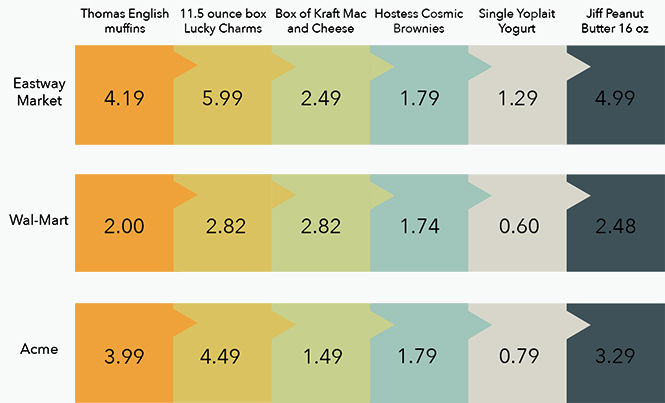Students discuss saving money on meal plan options
Grocery items at Eastway Market can be more expensive than those bought at off-campus grocery stores. Graphic by Lauren Friedman
November 23, 2014
One decision facing Kent State students living on campus is what meal plan is right for them. While this may not sound like a critical decision, picking the wrong meal plan could mean running out of money halfway through the semester or having hundreds left over at the end of the year.
There are four dining plans offered to students living on campus. These range in price from the Lite Plan, which is the least expensive: $1,750 each semester. The most expensive dining plan is the Premier Plus plan at $2,630.
Richard Roldan, director of university dining services, said before deciding on a plan, students should consider their eating habits, how often they plan to eat on campus and what their food budget for the semester will be.
The university meal plans are a good option for students because they are able to enjoy a variety of dining selections and locations without having to step off campus, Roldan said.
While they strive to make sure students have a wide variety of foods to choose from, some students still feel the dining halls lack a variety of choices.
“People always say it’s the same stuff, and I think people tend to eat the same things because that is what they are comfortable with,” Roldan said.
Roldan said if students are willing to try something different, they will see the wide variety of food available at on-campus eateries like Eastway.
“They have a lot of ethnic food that is really different,” said freshman pre-nursing major Angelicia Edwards, who purchased the Basic Plan. “They have a lot of options.”
Edwards said she thinks she may end up with a lot of leftover money on her plan because her busy schedule doesn’t allow for frequent sit-down meals in the dining halls.
Freshman pre-nursing major Melanie Ley also decided to purchase the Basic Plan.
“It was right in the middle, I didn’t want to go with the light and run out of money and I knew I wouldn’t eat a Premier,” Ley said.
Ley said she thinks the expense of the Basic Plan makes sense because students can use their meal plan to purchase groceries on campus.
While this is a convenient feature of the meal plan for students, grocery items are typically more expensive at one of the markets on campus.
“There is a bit of an upcharge here, but I understand why they do that,” Ley said. “They have to make a profit off of it as well.”
Edwards said she thinks the grocery items sold at the on-campus markets could be less expensive.
“We are college kids, and we don’t have a lot of money,” Edwards said. “I think it should be made more affordable.”
Contact Nathan Havenner at [email protected].












